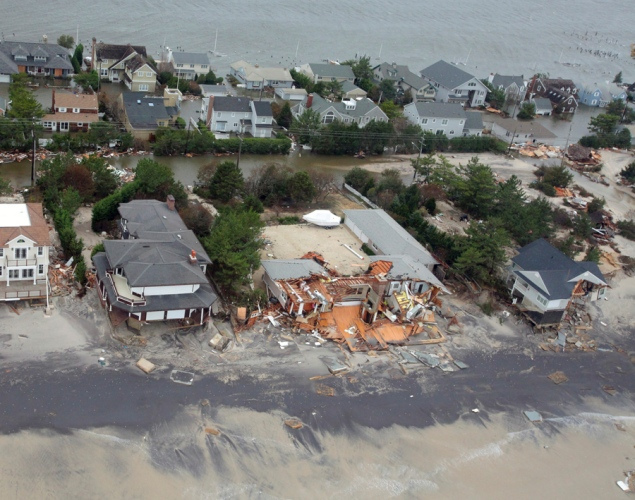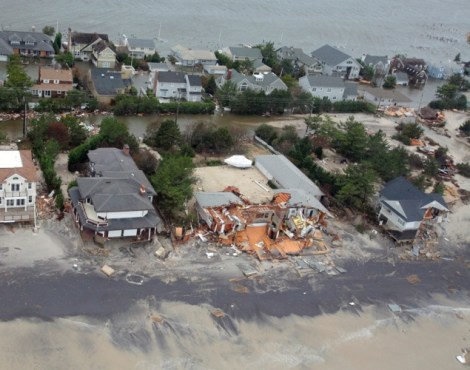Do you remember superstorm Sandy? Big storm that happened last year. Wiped out a bunch of houses; knocked out the transportation system in the nation’s largest city for a week. If you do remember it, you’ll be glad to hear that word of the disaster has finally reached Washington, D.C., our nation’s capital.
Today (already!) the House of Representatives will leap into action on providing aid to affected communities. We outlined how the vote was expected to go last week. Fox News provides an update:
The base $17 billion bill by the House Appropriations Committee is aimed at immediate Sandy recovery needs, including $5.4 billion for New York and New Jersey transit systems and $5.4 billion for the Federal Emergency Management Agency’s disaster relief aid fund.
Northeast lawmakers will have a chance to add to that bill with an amendment by Rep. Rodney Frelinghuysen, R-N.J., for an additional $33.7 billion, including $10.9 billion for public transportation projects. …
“We have more than enough votes, I’m confident of that,” said Rep. Peter King, R-N.Y., claiming strong support from Democrats and Republicans from the Northeast and other states for both the base $17 billion bill and the amendment for the additional $33.7 billion.
Well, we’ll see about that. I haven’t whipped the Congress, but I’ve seen enough of this House GOP to know that they won’t spend a dime on New York liberals without throwing some sort of tantrum.
Credit where it’s due, however. When the House passed the first part of a relief package, some $9.7 billion to support an almost-broke FEMA, a number of Republican lawmakers opposed the measure. One has changed his mind. From Talking Points Memo:
A little more than a week ago, Rep. Steven Palazzo (R-MS) was one of only 67 Republicans to vote against a bill to provide $9.7 billion in relief to victims of Hurricane Sandy that easily passed the House of Representatives. In a letter sent Monday to those very GOP members, Palazzo called on them to reverse their votes and help pass a larger Sandy aid measure that will be considered by the House this week.
Palazzo was the focus of online outrage, given his advocacy for aid to his home district after Hurricane Sandy. What changed his mind? The same thing that convinced people in New York to accept climate change.
[A] tour last week through Sandy-affected areas in the Northeast prompted a change of heart in Palazzo, who also delivered a floor speech Monday in support of a reform bill that would expedite the process by which the Federal Emergency Management Agency (FEMA) can distribute disaster aid.
Here, Palazzo speaks from the floor about his change of heart.
If you see this as a good sign, that opposition has fallen to 66 votes, be warned. The House will almost certainly approve the $17 billion proposed today. But the fight over that $33.7 billion could be ferocious. That $33 billion includes funding that would also provide initial support for the region to prepare for another significant storm — one key reason that the House bailed on providing aid in the first place.
Rep. Mick Mulvaney (R-S.C.) outlines the argument. Again from Talking Points Memo:
Rep. Mick Mulvaney (R-SC) on Tuesday explained why he intends to vote against a larger Hurricane Sandy relief package that will be taken up by the House of Representatives, arguing that the debt was “much, much smaller” when disaster aid was provided by the federal government in the past.
Appearing on CNN’s “Starting Point,” Mulvaney said he believes that providing disaster relief is “a proper and appropriate function of the government,” but his qualms with the Sandy relief bill stem from its lack of spending offsets. Mulvaney was one of 67 members, all Republicans, who voted against the initial $9.7 billion Sandy aid legislation that passed the House on Jan. 4.
To translate: Mulvaney wants to help! Seriously, he does! But when the government has helped before, the debt wasn’t so big. So instead of providing a tiny fraction of the federal budget to help people in need, we can only afford a very tiny fraction of it. Unless there are “offsets,” which is South Carolinian for “cuts to social services.”
Mulvaney’s best line, though, was this: “We simply cannot continue to do what we’ve done in the past. That’s how we arrived where we are.”
He did not mean this ironically. Mulvaney argues that we haven’t taken preventative action aimed at curtailing our problems, so he will not support efforts to take preventative action to curtail our problems.
Every decision made on Capitol Hill is political, of course, and there’s no reason to assume that this one wouldn’t be. But the slow, grudging process of bringing this bill to the floor, the moralizing and false outrage it has prompted, have been a black mark on the House of Representatives. Happily for the members, the body is already so smudged that one more mark is barely even visible.
Update: In a statement during the debate, Rep. Mulvaney says we didn’t need to worry about how to pay for the aid Congress appropriated after Hurricane Hugo (which hit his state) because debt was only $3 trillion. It’s not clear how much debt triggers his arbitrary distinction.



